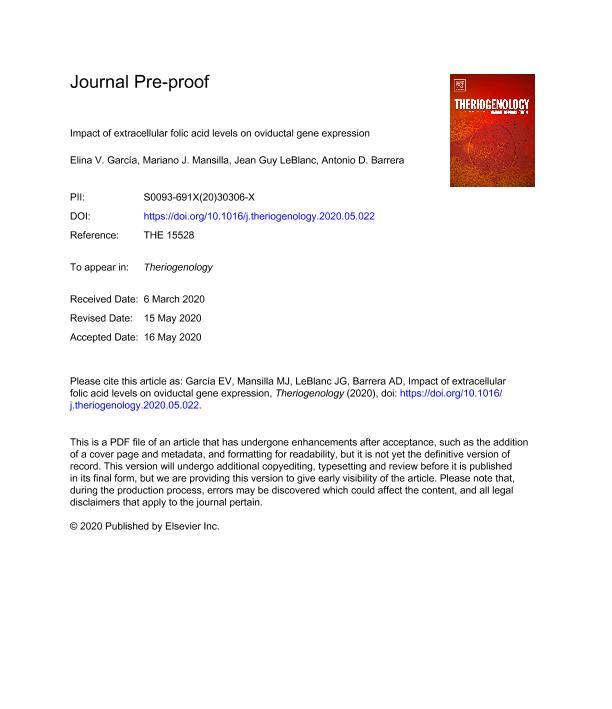Artículo
Impact of extracellular folic acid levels on oviductal gene expression
Fecha de publicación:
09/2020
Editorial:
Elsevier Science Inc
Revista:
Theriogenology
ISSN:
0093-691X
Idioma:
Inglés
Tipo de recurso:
Artículo publicado
Clasificación temática:
Resumen
Folate plays a specific role as methyl donor for nucleotide synthesis and genomic methylation patterns, which in turn are important epigenetic determinants in gene expression. Previous studies have revealed the presence of folate in bovine oviductal fluid as well as the existence of a fine-tuned regulation of the gene expression of folate receptors and transporters in bovine oviduct epithelial cells (BOECs). However, the functional implications of folate in the oviduct remain unknown. The present study aimed to assess the effect of folic acid (FA) on expression levels of selected genes that potentially respond to the folate status in in vitro BOECs. To obtain an insight into the optimization of a culture system for assays, gene expression of folate receptors and transporters was compared between BOECs grown in monolayers and in suspension. The results showed that BOECs from isthmus and ampulla in suspension culture better preserved the region-dependent gene expression profile than in monolayers. Subsequently, BOECs from both anatomical regions were separately cultured in suspension for 24 h assaying different FA concentrations: I) TCM-199 (control); II) TCM-199 + 1 μM FA (similar to the oviduct concentration); III) TCM-199 + 10 μM FA and IV) TCM-199 + 100 μM FA. Expression analysis of genes related to important cellular processes including folate transport, DNA methylation, cell-cell interaction, antioxidant activity and signaling pathways was performed in BOECs using RT-qPCR. Our data demonstrated that addition of 1 μM FA did not affect mRNA levels of most genes analyzed. In contrast, BOECs cultured with 10 μM FA exhibited increased mRNA expression levels of genes involved in folate intake, DNA methylation and antioxidant protection. It is worth noting that at 100 μM FA, transcriptional response in BOECs mainly resulted in decreased mRNA levels of the majority of the genes assayed. Interestingly, cytotoxicity analysis showed a similar LDH activity in the culture media of the experimental groups, indicating that cell integrity was not affected by the FA concentrations assayed. In conclusion, our findings suggest that folate can affect BOECs, promoting changes in gene activity in a framework of functional readjustments in response to environmental conditions.
Palabras clave:
FOLIC ACID
,
MICRONUTRIENT
,
OVIDUCT
,
OVIDUCTAL CELLS
,
TRANSCRIPTIONAL RESPONSE
Archivos asociados
Licencia
Identificadores
Colecciones
Articulos(CERELA)
Articulos de CENTRO DE REFERENCIA PARA LACTOBACILOS (I)
Articulos de CENTRO DE REFERENCIA PARA LACTOBACILOS (I)
Articulos(INSIBIO)
Articulos de INST.SUP.DE INVEST.BIOLOGICAS
Articulos de INST.SUP.DE INVEST.BIOLOGICAS
Citación
Garcia, Elina Vanesa; Mansilla, Mariano J.; Leblanc, Jean Guy Joseph; Barrera, Antonio Daniel; Impact of extracellular folic acid levels on oviductal gene expression; Elsevier Science Inc; Theriogenology; 154; 9-2020; 161-170
Compartir
Altmétricas




